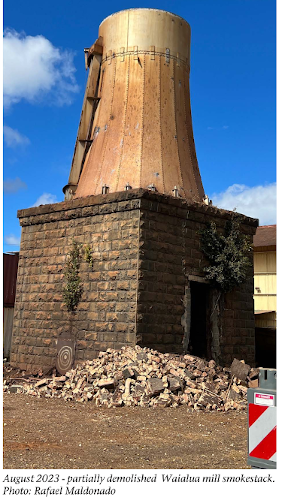By Haleiwa Waialua Historical Society
The most prominent Waialua landmark for decades has been the Waialua Sugar Mill’s smokestack. Towering over 100 feet, black-tipped, and iconic, it has represented our past and is part of our memories. You couldn’t miss it as you took the long, downhill drive from Wahiawa. Now at the end of its useful life it has been mostly taken down. Everyone noticed. Local TV news covered it, and there is a sadness mixed with a resolve to protect other landmarks of Waialua.
It was built in 1901. The solid stone foundation and wider base rows of brickwork, covered with heavy-gauge steel, still stands 122 years later. The Mill stack’s appearance has varied, from white, to WWII camouflage paint, to a ‘C&H’ logo, to just black tipped and weathered steel.
The vertical part of the stack was built of three rows of different ‘fire brick,’ then clad in sheet steel, riveted at first and later welded. The inner circle of brick is darker, a ‘carbide’ brick, partly metal to withstand the heat and corrosive gas. The next circle is a regular fire brick, and the third course a cheaper and softer brick for insulation. The metal cladding serves to hold it together and contain any gases. The stack had to be rebuilt from time to time due to rust and the bricks’ exposure to heat and gases. One re-build might require more than 90,000 bricks.
The mill was steam powered, with multiple boilers. At first wood or coal, then, for decades oil, was burned, and steam drove heavy gears and conveyers. Some of the ‘bagasse,’ left over from cane crushing, was burned with the oil but moisture made it hard to control. Bagasse was sold to make ‘canec,’ for ceilings and walls, the rest hauled and dumped. Engineers in the 1970s built equipment to dry the moist bagasse and used ducts and fans to blow it into the boilers. Generators then made renewable electricity for water pumps, the Waialua town, and for sale to Hawaiian Electric.
The mill stack was over 200 feet for its first seventy years. Wind at that height helped draw the smoke out. But with the big fans, such height was not needed, and the stack was lowered in a 1980s renovation to about 130 feet. Bricks from that rework are still seen in Waialua and at the North Shore Marketplace. It is now 38 feet tall, and looks just like the 1901 picture of the stack base.
Let’s keep the feeling of resolve, upon seeing that mill stack come down, to take action to preserve other Waialua landmarks. ‘Adaptive reuse’ can give old structures new life for new uses. That’s our goal for the threatened 1936 Waialua Sugar Co. headquarters building!
Mahalo to George Williams and Leif Andersen for information contributing to this article.



